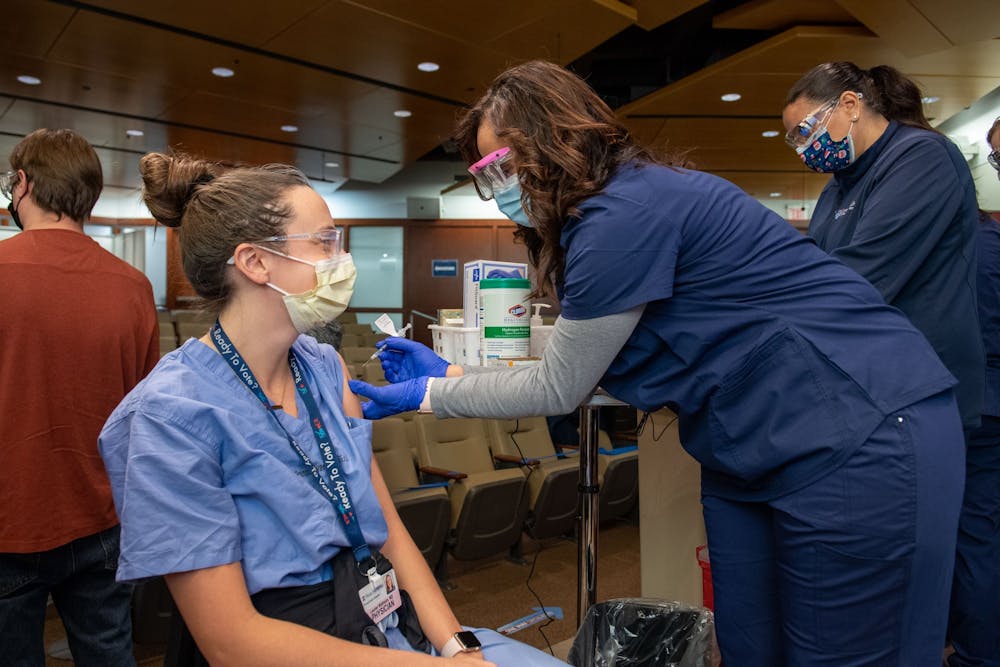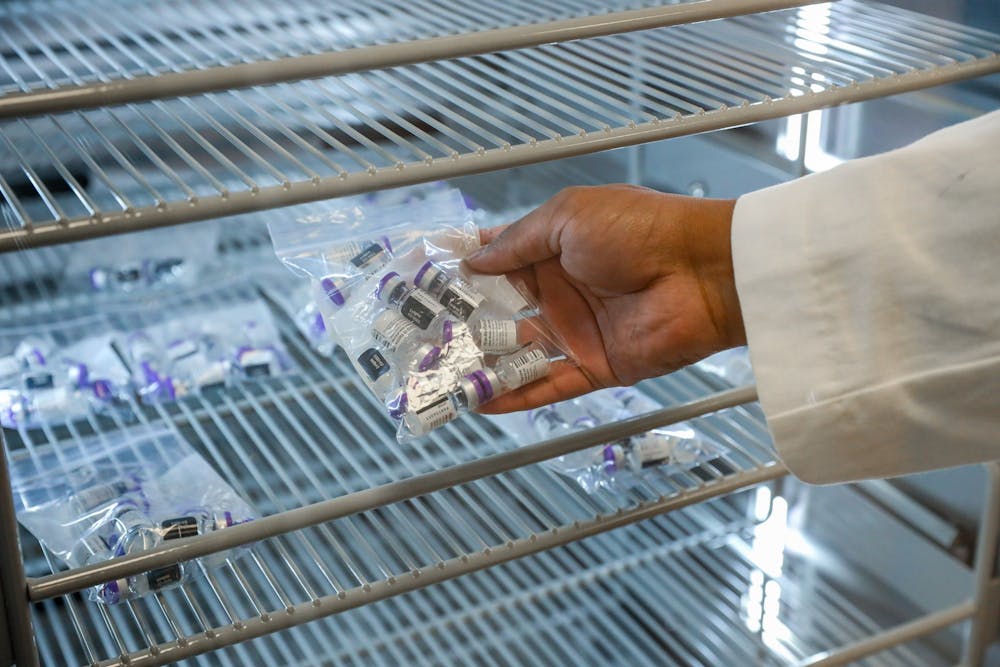
Lauren Walheim, MD, medical resident of the Pennsylvania Hospital OB/GYN program received the first dosage of the Pfizer/BioNtech COVID-19 vaccine on Dec. 16, 2020.
Credit: Courtesy of Penn MedicinePenn Medicine's frontline health workers and researchers have begun receiving COVID-19 vaccinations — including the Penn scientists whose research laid the groundwork for the vaccines to be developed.
The first set of COVID-19 vaccines were administered to Penn Medicine's frontline staff and researchers in mid-December, signaling the beginning of Pennsylvania's mass vaccine rollout efforts to combat the virus.
There was an “exciting energy” in the Pennsylvania Hospital auditorium on Dec. 16, the first day of vaccinations, first-year internal medicine resident Malika Gill said. She received the vaccine on Dec. 16.
Initial doses of the Pfizer vaccine were prioritized to staff members of the University of Pennsylvania Health System who have the greatest exposure to asymptomatic COVID-19 patients, she said. As an internist exposed to many potential asymptomatic carriers, Gill was able to book an appointment to receive the vaccine as soon as possible because she sees anywhere from 20 to 40 patients during her rotations.
Penn's health system encompasses six hospitals across the Philadelphia region, and Philadelphia County has more than 88,900 confirmed cases and over 2,500 deaths. As of Jan. 6, there were 693 COVID-19 patients in Philadelphia hospitals according to The Philadelphia Inquirer.
Other than mild muscle soreness and fatigue, Gill has not experienced any adverse reactions to the vaccine.
Internal medicine resident Dr. Karla Asturias was also excited to be among the first to receive the vaccine with Gill that day, in hopes of avoiding testing positive for and transmitting the virus to her patients.

Penn Medicine staff received the Pfizer/BioNtech COVID-19 vaccine shipments on Dec. 16, 2020.
Asturias said that the first wave of vaccinations felt like “fresh air” in the hospital and fostered an optimistic shift in staff members' moods that was sorely needed.
Penn professor and BioNTech senior vice president Katalin Karikó and professor of infectious diseases at Perelman School of Medicine Drew Weissman were also among the first to receive their first dose of the vaccine at Penn that week. Their findings on mRNA technology and therapy in 2005 laid the groundwork for the Pfizer-BioNTech and Moderna vaccines.
The Pfizer-BioNTech and Moderna vaccines were 95% and 94.1% effective in preventing COVID-19 among clinical trial participants, respectively, and Weissman said both vaccines have “essentially equal efficacy and equal adverse events."
“Karikó and I started investigating RNA in the late 1990s, and we figured out what made it so inflammatory and how to get rid of the inflammation. We published that research in 2005,” Weissman said. “That is when people, at least academics, started to get interested in its potential, and companies started to get interested in it around 2010.”
The initial intention behind their mRNA research was exploring methods of gene therapy, Karikó said, which is the concept of editing genes to treat and prevent disease. Only later did they discover it that the anti-inflammatory nature of their RNA research was ideal for vaccination delivery, she said.
Penn Medicine developed a prioritization system for distribution of COVID-19 vaccines within UPHS in accordance with local, state, and federal agency recommendations, Penn Today reported. The Pfizer vaccines will first be offered to the health system's frontline staff, like Gill, who work directly with patients in emergency situations and with those who have an unknown COVID-19 status, anticipating more staff to receive the vaccine as greater supplies become available through Food and Drug Administration approval.
“We were able to be a good example of a health care system where the doctors are able to receive the vaccine and felt comfortable receiving it,” Gill said, commending Penn’s organized distribution of the vaccine. “I hope it gives hope and faith to patients as well as people in the Philadelphia community and health care staff around the country.”
Gill said that each of the health care workers she spoke to felt like they had ample information regarding the vaccine's risks and benefits prior to receiving it, given that the Pfizer vaccine was approved for emergency distribution under an Emergency Use Authorization only five days prior to their vaccinations.
Karikó and Weissman expressed that it feels rewarding to see their research lead to a vaccine for the virus.
For Weissman, it had always been his dream “to make something that helps people.” Seeing the COVID-19 vaccine rollout and receiving his first dose proved that his aspiration was achievable, he said.
Karikó compared witnessing the vaccine’s release to the feeling of seeing her daughter, a professional rower and 2004 Penn graduate, win her Olympic gold medal: relief. After spending years defending her research and convincing others of its efficacy, Kariko said seeing the vaccines being effectively distributed is affirmation of her time and dedication.
“When I discovered the potential of the RNA, I had a feeling that it could be anything,” Karikó said. “But nobody believed, so I couldn’t release that feeling.”
In the 1990s, Karikó was on the path to professorship at Penn, but she was demoted after the University saw her work as too financially risky to fund. She stayed at Penn until 2013, never reinstated to her position even after the University patented the technology from Karikó and Weissman’s 2005 research.
Encouraged by scientist's efforts and the vaccine's approval for emergency use, those at Penn who received the vaccine now feel confident in its safety.
College junior Kendall Roseboro, who received the vaccine on Dec. 16 through her volunteer work with the Philadelphia-based Black Doctors COVID-19 Consortium, said she initially felt hesitant to receive the vaccine due to its expedited approval process. However, she gained confidence in the vaccine’s safety after doing personal research on mRNA vaccine trials, efficacy, and side effects. She advised others to do the same.
“Weigh the risks of possibly contracting COVID and bringing it to your loved ones versus potentially getting any side effects from the vaccine,” said Roseboro. “I’d rather get side effects from the vaccine that will protect me than possibly get the virus and not know how it will affect me.”
Like Roseboro, Gill said that after doing her own research she felt “full faith and trust” in scientists who developed the vaccine and authorized its use.

Vials of the Pfizer/BioNtech COVID-19 vaccine are stored at -80°C freezers.
Since the pandemic started, Gill explained that there always was some apprehension and risk when practicing medicine. Throughout the past nine months, she said, the health care staff had to be aware that there were many patients who tested negative for the virus when they were admitted to the hospital, but later tested positive as an inpatient.
“Especially back in March, we did not know much about the coronavirus, so there was a lot of fear, but you feel a duty to go off and see these patients regardless of what their COVID status was,” Gill said. "Even when it had quieted down in the summer, we all definitely had to keep the underlying risk in the back of our heads and be cautious with every patient we saw.”
Now that she is vaccinated, Gill said she feels a greater peace of mind when working with all of her patients, even as she and her peers continue following social distancing and personal protective equipment precautions. As thousands of Pennsylvanians continue to test positive for COVID-19 each day, she believes the vaccine developments mark the first “huge milestone” in conquering this intense stage of the pandemic, and also feels fortunate to have received one of the first vaccine doses.
Looking forward, Weissman urged people who have access to COVID-19 vaccines to get vaccinated and asserted that any claims that the vaccine's trial process was too sped up are unfounded.
“The vaccine is safe, it doesn't change your DNA, and it doesn't have any long term effects,” Weissman said. “There is a lot of evidence to say that it's very effective, and if we want to get rid of this pandemic, people need to take it.”
Gill similarly urged people to take the vaccine once they receive access, saying that they should "not be afraid" of it.
While it is estimated that it will be months before the general public is vaccinated, hundreds of thousands of have been distributed in the last month with the state currently planning for mass vaccination sites.
“We’re seeing an end to this,” Asturias said. “We definitely have a long way to go, but now the attitude among my coworkers is different; we have more hope.”
The Daily Pennsylvanian is an independent, student-run newspaper. Please consider making a donation to support the coverage that shapes the University. Your generosity ensures a future of strong journalism at Penn.
Donate







